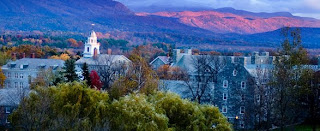Today I learned that a friend from college passed away in a car crash over the weekend. Ian was one of those guys that I always just knew: we were placed in the same small freshman dorm and I can’t remember a day of college that I did not consider Ian Burgin a friend. He and I were cut from very different trees. I liked to play the part of the Southern belle, walking around the Vermont campus in my heels, and if there was snow, I most likely fell into it (while wearing snow boots, lest you think I’m too crazy). Ian, on the other hand, was from northwestern Massachusetts, not too far down the road from Middlebury. He was fond of the outdoors and plaid, studied Environmental sciences, and, I was convinced, was going to have some fabulous impact within the realm of sustainability. Where I spent many months holding my breath when the smell of manure began to waft its way through the state, Ian inhaled deeply, saying it reminded him of home.
Despite our differences, I loved the person Ian was and I always enjoyed his company. He was a wonderful person, so genuinely good, and good to talk to. One of my favorite memories of him is a recurring one: breakfast in Atwater dining hall. Always mindful of health and fitness, he started every day with a balanced meal, which included hard-boiled eggs. He would carefully peel the shell, separate the white from the yolk, and, leaving the latter on his plate, eat the protein-rich and cholesterol-free egg white, without seasoning. I was appalled. How can you eat that without the yummy goodness of the fatty yolk…and no salt?, I asked him throughout our first year. It just didn’t seem worth it to me. Ian, however, was more concerned with the healthful benefits of the egg over its flavor.
Over the years, our conversations often turned to food, sustainable eating, and farming, and the egg became less of an issue. His mother, he once told me, was involved in Barbara Kingsolver’s “Animal, Vegetable, Miracle,” a book about one family’s decision to eat only food produced in the place where they live. I assumed this was his community in Massachusetts, but I never asked. Ian was someone who grew up with the ethos of local eating, something that I am only just discovering.
Ian and I did not stay in touch after college, our lives shaped more by our divergent interests than the ones we shared. All the more reason I was so deeply affected today by the news of his death. Ian, you are in my prayers.
The Perfect Hard-Boiled Egg, for Ian
- Place the egg in a saucepan and cover with cold water. Do not salt the water.
- Over high heat, bring the water to a boil.
- Once a rolling boil is achieved, set timer for 3 minutes and let the egg cook.
- After 3 minutes have passed, remove from heat. Let the egg sit in the water for another 8 minutes. Then, remove from the hot water and run under cold water, about a minute.
- Let sit in the refrigerator for a half hour to an hour for best peeling results.



